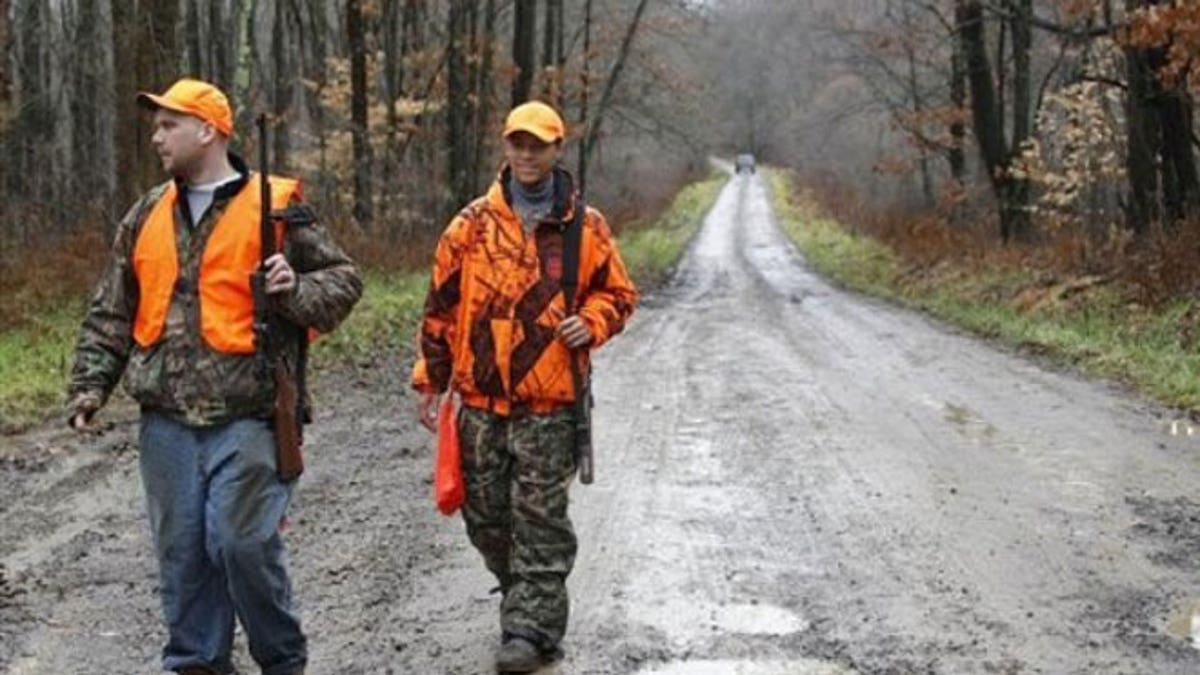
November 28, 2011: Deer hunters hike down a gravel road in Moraine State Park on the first day of Pennsylvania's white-tailed deer rifle hunting season in West Liberty, Pa. (AP)
WASHINGTON – A hunting bill passed by the House on Tuesday makes it harder to restrict hunting and fishing on public lands and ensures that the hunter's arsenal will continue to include lead bullets
The legislation, which passed 274-146, also allows those who have legally hunted polar bears in Canada to bring their trophies home.
Republican sponsors said the bill, which faces an uncertain future in the Senate, protects sportsmen from bureaucratic restrictions. Democratic opponents said it was unneeded because 85 percent of federal land is open to hunting and called it a sop to the gun lobby.
The measure requires federal land managers to support hunting and fishing on Forest Service and Bureau of Land Management land. The BLM can only close public lands to recreational shooting for specific reasons such as national security and fire safety. It must also submit a report to Congress detailing the location and evidence justifying any closure.
The lead issue refers to efforts by environmentalists to ban the use of lead in ammunition and fishing tackle. They say lead poisoning kills 10 million to 20 million birds and other animals every year and that hunters who eat what they hunt have also been shown to have higher levels of lead in their bloodstreams.
The Environmental Protection Agency, in 2010 and again this year, rejected petitions from conservation and some hunting groups to ban lead bullets, shotgun pellets and fishing tackle under the Toxic Substances Control Act, saying the issue was not within the agency's jurisdiction.
The House bill would give legal backing to that position, by clearly limiting the EPA's authority under the Toxic Substances Control Act. It amends that act to allow for the sales of traditional ammunition and fishing tackle.
Congress in 1976 banned the EPA from regulating ammunition, but anti-lead groups have argued that that ban does not prohibit the agency from regulating the components of ammunition.
Bill Snape, senior counsel for the Center for Biological Diversity, one of the petitioners, said there are many commercially available alternatives to lead ammunition. "No one wants to take away hunting by those who hunt by the rules," he said. "What we are trying to do is stop hunting with ammunition that harms everything in sight."
The American Bird Conservancy, which did not participate in the most recent petition, said 3,000 tons of lead are shot into the environment by hunting every year, 4,000 tons are lost in ponds and streams and 80,000 tons released at shooting ranges. At least 75 wild bird species are poisoned by spent lead ammunition, including bald eagles and endangered California condors, it said.
Rep. Jeff Miller, R-Fla., a main sponsor of the bill, countered that "with very limited exceptions, there is simply no sound evidence that the use of traditional ammunition is causing harm to wildlife or their population." He added that, according to the Centers for Disease Control, "there has never, never been a case where lead poisoning has been traced to wild game meat."
The polar bear provision allows the import of a limited number of hunting trophies legally taken in Canada. Trophy hunting of polar bears has been banned in Alaska since 1972, but Canada does permit some restricted hunting of the bear. The bill addresses past import disputes and does not open the door to unlimited future imports.
Lawmakers also approved an amendment by Rep. Virginia Foxx, R-N.C., to limit the president's authority to set aside historic and culturally important federal lands under the 1906 Antiquities Act. Critics say presidents have usurped legislative rights in using the act, and Foxx's amendment would require that state legislatures and governors approve such designations.




